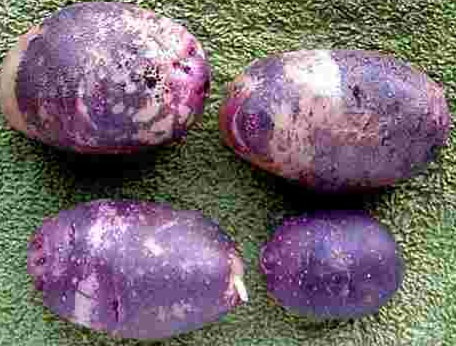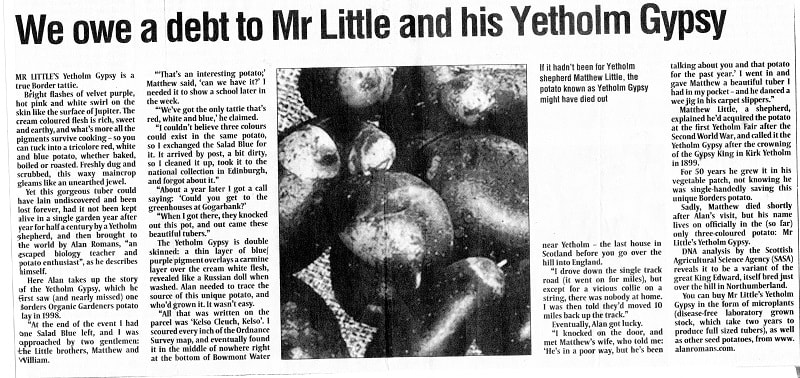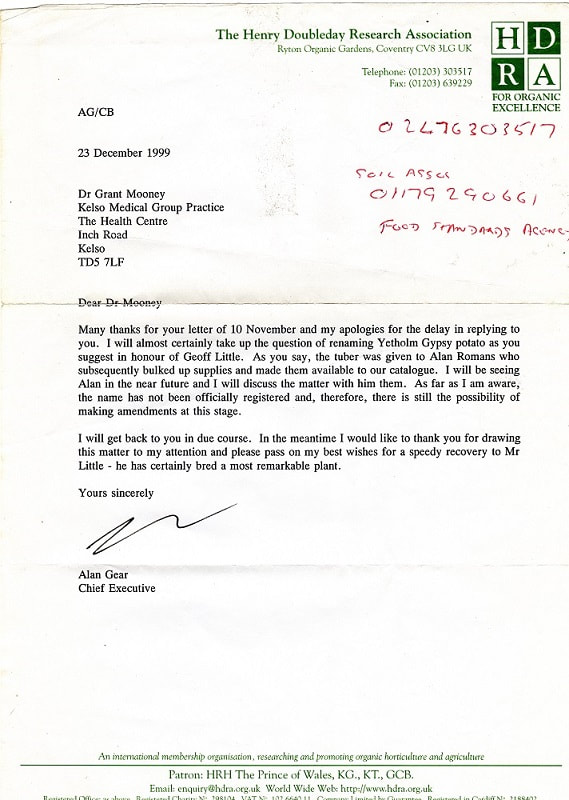|
The last two blogs have had a horticultural theme – and this one has too – a trilogy! If you type ‘Yetholm’ into a search engine one of the results will almost certainly take you to a site about ‘Mr Little’s Yetholm Gypsy potato’. See, for example - HERE According to this site - Mr Little’s Yetholm Gypsy is a distinctive and unique heritage potato with a name which summarises its historical connection to its original community. It has a unique colour with an eyecatching and distinctive red, white and blue patterned skin, and has a versatile flesh good for boiling, steaming and roasting. It has significant ties to the Scottish Borders town of Yetholm in terms of cultural heritage. The potato appears to have been kept in production almost by chance. Interestingly this site suggests that “the DNA of Yetholm Gypsy has been tested by S.A.S.A. (Scottish Agricultural Science Agency) where it is held in their collection, and it has been found to be a variant of the King Edward potato.” This may well be the case, but the site’s discussion of the potato’s origin may not be entirely right in all of its claims: It comes from the Borders town of Yetholm and was thought to have been introduced to the town in 1899, although it is not known for certain whether this variety was originally bred by gypsies or by a local gardener. It was however, acquired at a horse fair by its namesake ‘Mr Little’ who then apparently grew it in his family’s garden for the next 50 years, keeping the potato in production. The potato variety was ‘discovered’ in 1998 by Alan Romans who got a tuber from the family, encouraged growth of it through his microplants project, and had the potato placed in the National Collection in 1999. Yetholm History Society has been given a newspaper cutting, unfortunately unsourced and undated (but fairly recent & probably from the Southern Reporter) which features an interview with Alan Romans – Mr Romans says he was given a sample of the potato by Matthew and William (sic - Geoff) Little at the Borders Organic potato Day in 1998. Mr Romans obviously found the journey down the Bowmont Valley to Kelsocleugh to meet the Little brothers an arduous and unnerving experience! The article provides us with a slightly different origin story: Matthew Little, a shepherd, explained he’s acquired the potato at the first Yetholm Fair after the Second World War, and called it the Yetholm Gypsy after the crowing of the Gypsy King in Kirk Yetholm in 1899 (sic – 1898) This sounds plausible, but we have slightly different information from Dr Grant Mooney, who was Yetholm’s doctor in the 1990s. He knew both Matthew and Geoff Little and recalls that when they visited him in the surgery in Yetholm (now sadly gone) in the early 1990s they would often bring him a bucket of the Yetholm Gypsy potatoes. Geoff was the shepherd at Kelsocleugh and Matthew the shepherd at Skirl Naked, over the border in Northumberland. His memory is that Matthew’s father – also called Matthew, who at one time was shepherd at Cocklawfoot, neighbouring Kelsocleugh - may have had a version of the potato and that Matthew later ‘rediscovered’ the potato growing ‘on the other side of a dike’ at Skirl Naked. When he returned to live in Yetholm he brought the potato with him. It is clear, in any case, that the Little brothers were proud of their tri-coloured potato and that the name, honouring Yetholm, derives from them. Although proud of their potato, it was not however not the Little brothers who added the prefix - ‘Mr Little’s Yetholm Potato’. For that, Dr Mooney was responsible. When Geoff, his patient, was in hospital towards the end of his life Grant wrote to the Henry Doubleday Research Association suggesting that the newly rediscovered variety should be named in honour of the brothers. The letter he got in response, which has been kindly donated to YHS, is shown below. Geoff was cheered when he then got a letter informing him of the new name. Matt apparently was a bit miffed that he hadn’t received one as well, so a similar acknowledgement was duly sent to him too!
1 Comment
|
Archives
July 2024
|



 RSS Feed
RSS Feed
